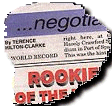

Trinidad and Tobago vs Mexico- Match 8.10.00
By TERENCE HILTON-CLARKE
(c)copyright
![]()
October 7, 2000
WELL the Games of the 27th Olympiad have now been consigned to history: the various athletes came, saw and conquered, millions of sporting fans experienced the joy of witnessing dozens of great achievements – either live or via television – and the countdown to Athens 2004 is already three days old.
Which all means that it is now time to deal with the small matter of this Sunday’s World Cup qualifying match in Mexico City. That is right. Mexico versus Trinidad and Tobago: the return version of the July 23 game, in which this country recorded a shocking 1-0 victory over the regional giants.
Mexico versus Trinidad and Tobago: a fixture that now takes place in the midst of a burgeoning club versus country battle - one that had been forecast at the beginning of this season. It seems that the biggest casualty of the current affair is Dwight Yorke, the Manchester United forward who had a bit of a falling out with manager, Alex Ferguson, prior to last week’s Premier League game against Chelsea. Yorke’s role for United, so far this year, has been very marginal and he has featured in the starting line-up on only a few, sparse occasions. It was inevitable that frustration would set in, and this was manifested in events at Old Trafford, during which Yorke left the ground after learning of his exclusion from the list of 16 altogether.
Of course, all of this followed the sanctioning of Yorke, to the tune of 30,000 pounds, following his late arrival after Trinidad and Tobago’s last World Cup game against Canada. Ferguson expressed his disapproval of one of his top players returning late – with an injury, no less – and, since then, Yorke has voiced the opinion that his fringe status at Old Trafford may, indeed, be related to his sojourns back home, in the name of national duty. Not a very good sign, when one thinks about it.
Anyway, Yorke was not the only one to suffer financially for his tardiness; Russell Latapy also saw some of his salary deducted. The excuse of missing the flight home did not sit well with the Hibernian club officials either. Still, it must be said that, with Trinidad and Tobago having already iced a spot in the final round, both men were among those who realized that the opportunity was ripe for skipping the last two group games, rather than straining relations with their clubs even further. We all know about the situation with Anthony Rougier and his desire to try and establish himself at his new club: there is also the uncertainty surrounding the participation of Stern John – still below peak form, seven months after suffering his injury.
So, it is not surprising that coach Ian Porterfield is being gradually left with a group of mostly fringe players for the last two games against Mexico and Panama. Already, there is the news that Hector Sam will be getting another opportunity to try and prove himself, perhaps alongside another in-form young striker in Nigel Pierre. The rest of the line-up is likely to feature other graduates from the under-23 team, including Carlos Edwards and Brent Sancho. All this was expected, given this country’s qualification for the final round. But, what is disturbing is the growing influence of European club policies on the global game. The Olympic Games football tournament saw the absences of several top stars, mostly because of the reluctance of their clubs to release them for a tournament, thousands of miles away – even if it did take place during the early part of the season.
There is hope that the establishment of a unified international football calendar may curb the anxiety emitted by coaches over the frequent absences, and risk of injury to, their top non-European players. However, this may not be enough. The increasing monetary stakes being generated by corporate sponsorship and European cable television networks are serving to exacerbate the already myopic view of many: one that is merely focussed on the domestic and continental competitions that carry such incentives, at the expense of any outside interests, including international football competitions. Once again, a call is made to FIFA to recognize the problem that is lying there before it and to try and do something before it is too late. The pressure that is being placed on small countries such as Trinidad and Tobago to make do without its top performers, along with the encouraging of players to eschew international competitions are ominous signs that European football interests are beginning to step out of line with those of the global game. The decline of tournaments such as the Olympic Games, Copa America and African Nations Cup is now a possibility and the need for FIFA to come up with a viable solution to this situation is becoming more and more urgent.




